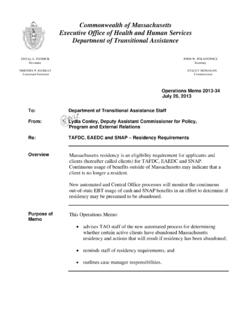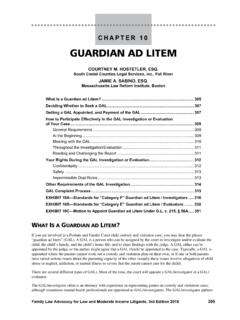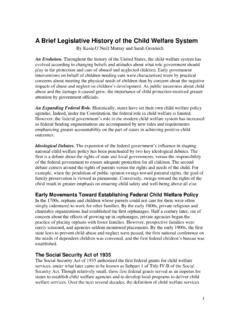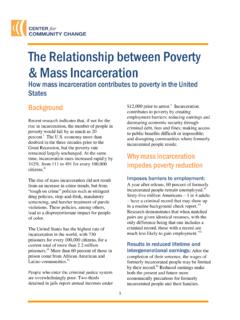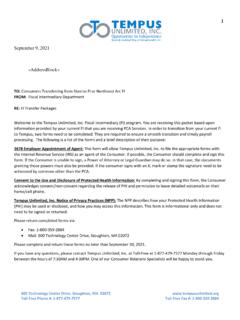Transcription of OVERVIEW OF THE PROBATE AND FAMILY COURT
1 FAMILY Law Advocacy for Low and Moderate Income Litigants, 3rd Edition 2018 7 CHAPTER 2 OVERVIEW OF THE PROBATE AND FAMILY COURT CHERYL L. GARRITY, ESQ. Burlington How the System Works .. 9 What Are the Powers of the PROBATE and FAMILY COURT to Handle FAMILY Law Problems? .. 9 Sources of Law .. 9 How to Behave in COURT .. 10 The Probation Department (Formerly the FAMILY Service Office) .. 10 Parent Education Program .. 11 Income, Accessibility, and Language Issues .. 12 What Do You Do if You Cannot Afford to Pay the Filing Fee or Other Costs Associated with Litigation? .. 12 What Do You Do if You Want an Attorney Appointed to Represent You or Your Child? .. 12 What Do You Do if You Want to Try to Settle Your Case? .. 13 What Do You Do if You Have a Hearing Impairment or Language Issue that May Interfere with Communication with the COURT ?
2 13 Pleading and Pretrial Preparation .. 14 How Does a Case Get Started? .. 14 Selecting the Proper Action and Complaint .. 14 Divorce ( c. 208, 1, 1A, 1B) .. 14 Complaint for Separate Support ( c. 209, 32) .. 14 Complaint for Support ( c. 209, 32F) .. 14 Complaint to Establish Paternity ( c. 209C) .. 15 Complaint for Support, Custody, or Parenting Time ( c. 209C) .. 15 Complaint from Abuse ( c. 209A) .. 15 Complaint for Modification ( c. 208, 28, 37; c. 209, 37; c. 209C, 20) .. 15 Complaint for Contempt ( c. 215, 34, 35) .. 15 Complaint for Grandparent Visitation ( c. 119, 39D) .. 15 Complaint for Guardianship or Conservatorship of a Minor ( c. 190B) .. 15 Serving the Complaint .. 15 Answers and Counterclaims .. 16 Time Standards .. 16 Financial Statements and Other Required Forms .. 17 What Is a Financial Statement and What Are the Rules Governing Them?
3 17 Motions and Temporary Orders .. 18 CHAPTER 2: OVERVIEW OF THE PROBATE AND FAMILY COURT 8 FAMILY Law Advocacy for Low and Moderate Income Litigants, 3rd Edition 2018 What Is a Motion? .. 18 How to Make a Motion and Schedule a Hearing .. 18 How Do You Respond to a Motion? .. 19 What Happens at the Motion Hearing? .. 19 Final Judgment .. 19 Discovery .. 19 Compelling the Presence of Witnesses and Documents:The Subpoena .. 20 Selected Evidentiary Issues .. 21 Use of Witnesses .. 21 Expert Witnesses .. 21 Subpoena Witnesses .. 21 Guardians ad Litem and Their Reports .. 22 How to Challenge a GAL s Report .. 22 Medical Records .. 23 Privileges .. 23 Religious Privilege .. 24 Attorney-Client Privilege .. 24 Spousal Privilege .. 24 Privilege Against Self-Incrimination .. 25 Mediator Privilege .. 25 Social Worker Client Privilege.
4 25 Allied Mental Health Professional Privilege .. 25 Psychiatrist, Psychotherapist, and Psychologist Privilege .. 25 Exceptions in Child Custody Cases .. 26 Marital Therapist Privilege .. 26 Sexual-Assault Counselors and Domestic-Violence Counselors .. 26 Procedure for Obtaining Access to Therapy Records .. 26 EXHIBIT 2A Affidavit of Indigency and Request for Waiver, Substitution, or State Payment of Fees and Costs .. 28 EXHIBIT 2B Supplement to Affidavit of Indigency .. 34 EXHIBIT 2C Request for Counsel .. 38 EXHIBIT 2D Answer to Complaint for Divorce .. 39 EXHIBIT 2E Counterclaim for Divorce Action .. 41 EXHIBIT 2F Request for Financial Statement .. 43 EXHIBIT 2G Plaintiff s Motion for Temporary Orders .. 44 EXHIBIT 2H Proposed Temporary Orders .. 46 EXHIBIT 2I Affidavit in Support of Motion for Temporary Orders .. 47 EXHIBIT 2J Pretrial Notice and Order.
5 48 EXHIBIT 2K Plaintiff s Pretrial Memorandum .. 50 EXHIBIT 2L Interrogatories Propounded by the Defendant to Be Answered by the Plaintiff .. 56 EXHIBIT 2M Request for Production of Documents .. 59 EXHIBIT 2N Subpoena to Obtain Documents for COURT .. 60 EXHIBIT 2O Motion to Strike Portions of the Guardian ad Litem s Report .. 63 CHAPTER 2: OVERVIEW OF THE PROBATE AND FAMILY COURT FAMILY Law Advocacy for Low and Moderate Income Litigants, 3rd Edition 2018 9 HOW THE SYSTEM WORKS What Are the Powers of the PROBATE and FAMILY COURT to Handle FAMILY Law Problems? The PROBATE and FAMILY COURT has the power and authority to handle most FAMILY law problems and to grant relief for most FAMILY law issues. The powers described here are not a complete list of PROBATE and FAMILY COURT authority. The jurisdiction of the PROBATE and FAMILY COURT is established by c.
6 215, 3, 4, 6, and 6C. The PROBATE and FAMILY COURT has jurisdiction over a number of FAMILY -law related matters, such as the following: to grant divorces, c. 208; to grant judgments of separate support and maintenance of spouses and their children, c. 209; to make orders to prevent domestic violence and abuse, c. 208, 18, 34B; c. 209, 32; c. 209A; c. 209C, 15; to make orders for the support of children, as temporary orders pending a final judgment ( c. 208, 19, 20; c. 209, 32F; c. 209A, 3; c. 209C, 15; c. 215, 6C) and as part of a judgment ( c. 208, 28; c. 209, 32, 37; c. 209C, 15); to make orders and judgments for the support for spouses both during a marriage, upon divorce, and after divorce ( c. 208, 17, 34; c. 209, 32), and for abused persons ( c. 209A, 3); to divide marital property, c.
7 208, 34; to order conveyances of real estate from one spouse to the other, c. 208, 34A; c. 209, 32D; to make orders and judgments relative to child custody and visitation, c. 208, 19, 28, 28A, 31A; c. 209, 32, 38; c. 209A, 3; c. 209C, 10, 15; to make decisions about the guardianship and conservatorship of minors, c. 190B; to order investigations and reports to it of matters involving the care, custody, or maintenance of minor children by appointing a guardian ad litem ( c. 215, 56A) or, in a divorce case, an attorney ( c. 208, 16), and it can order that the cost of these investigations be paid by the Commonwealth; to order probation officers (who are also known in the PROBATE and FAMILY COURT as FAMILY service officers) to conduct investigations, c. 276, 85A; to enforce custodial rights by issuing writs of habeas corpus to bring a child before it, c.
8 208, 32; to make judgments establishing the paternity of children born out of wedlock and to make orders and judgments relative to the custody and support of those children, c. 209C; to modify and revise its judgments and orders, c. 208, 28, 28A; c. 209, 37; c. 215, 6C; and to secure support and maintenance of spouses and children by attachment ( c. 208, 12, 33; c. 209, 33) and by trustee process ( c. 208, 36A; c. 209, 33), as well as the power to enforce its orders by contempt ( , fining or imprisoning the disobedient party until he or she complies) ( c. 215, 34). SOURCES OF LAW For the primary sources of law relating to FAMILY law matters, refer to the following chapters of the Massachusetts General Laws: c. 208 Divorce c. 209 Husbands and Wives c. 209A Abuse Prevention c. 209B Massachusetts Child Custody Jurisdiction Act c.
9 209C Children Born Out of Wedlock (Paternity) c. 209D Uniform Interstate FAMILY Support Act CHAPTER 2: OVERVIEW OF THE PROBATE AND FAMILY COURT 10 FAMILY Law Advocacy for Low and Moderate Income Litigants, 3rd Edition 2018 c. 119A Child Support Enforcement c. 190B Guardianship and Conservatorship of Minors c. 215 PROBATE Courts The following are the pertinent rules of COURT governing FAMILY law practice: Massachusetts Rules of Domestic Relations Procedure (Mass. R. Dom. Rel. P.); Uniform Practices of the PROBATE COURT (Unif. Prob. Ct. Prac.); PROBATE COURT Rules (Prob. Ct. R.); Trial COURT Rules; Standing Orders of the PROBATE and FAMILY COURT ; and Child Support Guidelines. How to Behave in COURT The PROBATE and FAMILY COURT conducts serious business; it makes critical decisions that will affect the lives of your FAMILY and your children.
10 It is extremely important for you to behave in a dignified and mature manner. Dress neatly and conservatively and always address the judge as Your Honor. If you do not, you could jeopardize the outcome of your case. It is also important that you be prepared. Before your COURT date, review any pleadings filed, outline your key thoughts, and list the specific actions you want the COURT to take. Know what you want to say and how you want to say it. It is important to state your case clearly and concisely. The forms and documents you prepare, using the samples included in this book, can be used to help get your thoughts in order. When you go before a judge or meet with a probation officer, you will have a turn to speak and state your case. Do not interrupt the other person, the attorney, or the judge; you will have the opportunity to respond in due time.
